
A new Pew Research Center survey finds substantial public support for several forms of U.S. foreign aid.
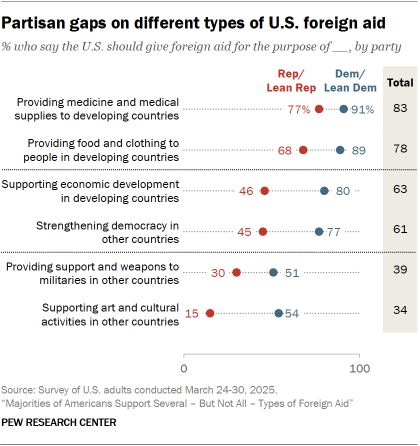
Around eight-in-ten Americans say the United States should provide medicine and medical supplies, as well as food and clothing, to people in developing countries. Roughly six-in-ten believe the U.S. should give aid that supports economic development and helps strengthen democracy in other nations. There is less support, however, for providing military aid or funding art and cultural activities.
Democrats and Democratic-leaning independents are consistently more supportive of foreign aid than Republicans and Republican leaners. Still, majorities of Republicans say the U.S. should give developing nations medicine and medical supplies, along with food and clothing. And more than four-in-ten Republicans support aid meant to boost economic development and strengthen democracy.
The survey was conducted after President Donald Trump and his administration ended most activities of the U.S. Agency for International Development (USAID).
In general, 45% of U.S. adults disapprove of ending most USAID programs, while 35% approve. (For more, read “Americans Give Early Trump Foreign Policy Actions Mixed or Negative Reviews.”)
The new survey also finds that Democrats and Republicans hold different views about the value of international engagement and cooperation.
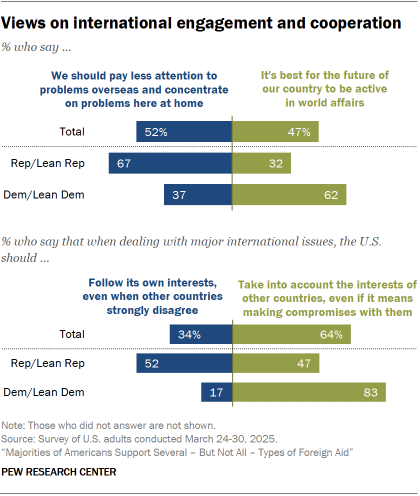
For instance, when asked which comes closer to their opinion – “It’s best for the future of our country to be active in world affairs” or “We should pay less attention to problems overseas and concentrate on problems here at home” – 62% of Democrats choose the former. In contrast, 67% of Republicans favor a domestic focus.
A majority of Americans (64%) say the U.S. should take into account the interests of other countries when dealing with major international issues, even if it means making compromises. This compares with 34% who say the U.S. should follow its own interests, even when other countries strongly disagree.
Around eight-in-ten Democrats (83%) think the U.S. should take into account the interests of other countries. Republicans are divided: 47% say the U.S. should consider other countries, while 52% say it should follow its own interests.
Which nation poses the greatest threat to the U.S.?
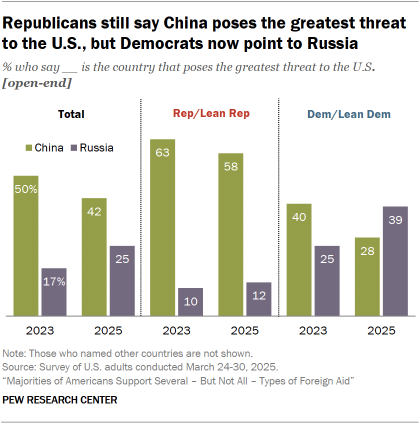
When asked to name the country they believe poses the greatest threat to the U.S. in an open-ended question, 42% of Americans say China, while 25% say Russia. No other country is named by more than 5% of adults, and roughly a quarter say either that they are not sure or that no country poses the greatest threat.
Responses to this question have shifted somewhat since we last asked it two years ago. In 2023, both Republicans and Democrats named China as the top threat to the U.S. That’s still the case among Republicans (a 58% majority name China), but Democrats now say Russia is the greatest threat (39% vs. 28% who name China).
Do Americans have positive or negative views of major countries?
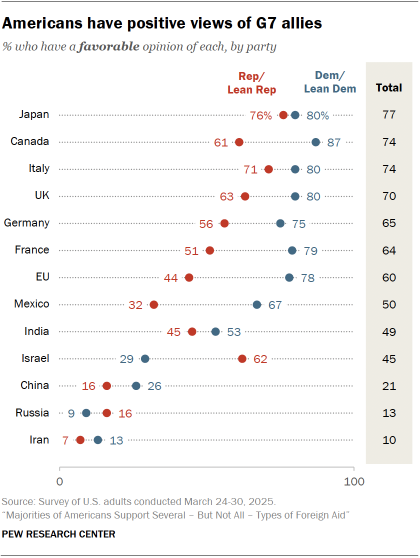
We also asked respondents whether they have a favorable or unfavorable opinion of several countries and international organizations, including the European Union.
The countries receiving the highest ratings are the six that, along with the U.S., compose the G7: Japan, Canada, Italy, the United Kingdom, Germany and France. Over six-in-ten rate each of these countries favorably, including roughly half or more among both Democrats and Republicans.
Americans also give the EU generally positive ratings.
In contrast, few see China (21%), Russia (13%) or Iran (10%) positively.
Democrats are more likely than Republicans to rate most countries we asked about favorably. Republicans, however, are more than twice as likely as Democrats to give Israel a positive rating (62% vs. 29%). The only other country that Republicans rate more highly than Democrats is Russia (16% vs. 9%).
Which countries are gaining or losing influence?
We also asked respondents whether they believe the influence of certain countries has been getting stronger, getting weaker or staying about the same in recent years. Americans are more likely to say their own country is losing influence than they are to say this about any other nation.
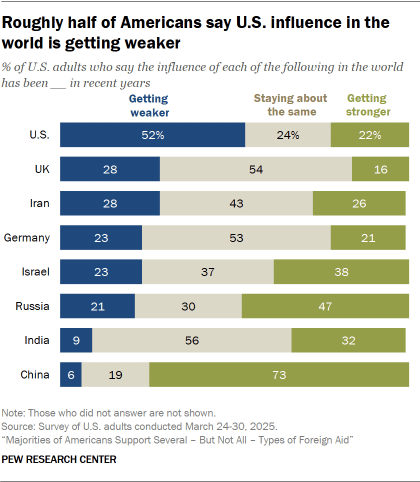
Roughly half of Americans (52%) say the influence of the U.S. has been getting weaker in recent years, including 67% of Democrats and 37% of Republicans. Partisan views are essentially reversed from last year: In 2024, 67% of Republicans said the United States’ influence has been declining, compared with 44% of Democrats.
Far fewer Americans overall say U.S. influence is getter stronger, though the share who feel this way has grown since last year (22% vs. 14% in 2024).
In their assessments of other countries, Americans are particularly likely to believe China is gaining influence in world affairs (73%). Nearly half say Russia’s influence is getting stronger, while roughly four-in-ten say this about Israel.
Perceptions of Iran, which has suffered a number of military and strategic setbacks over the past year, have changed since 2024. More Americans think Iran’s influence is waning (28% vs. 16% in 2024) and fewer say it is getting stronger (26% vs. 39% in 2024).
These are among the findings of a Pew Research Center survey conducted March 24-30, 2025, among 3,605 U.S. adults. The survey followed the Trump administration’s ending of most USAID programs, and while it was in the field, the administration announced plans to cut nearly all of the agency’s staff. It took place before Trump announced sweeping tariffs on many countries in April.
In addition to the topics above, the survey explores U.S. public opinion on a variety of other foreign policy issues.
How important is it that the U.S. is respected around the world?
- 91% of Americans believe it is important that the U.S. is respected around the world, including 57% who say this is very important.
- Fewer, however, think the U.S. actually is respected (56%). Republicans are much more likely than Democrats to express this view (72% vs. 39%).
Military and economic power
- Though many believe the U.S. is losing global influence, 76% still say the U.S. is the world’s leading military power and 48% say it is the top economic power.
- 14% say China is the top military power, while 8% say Russia. And 38% say China is the world’s leading economy, while 7% say Japan and 6% say the countries of the EU.
- Republicans are more likely than Democrats both to see the U.S. as the leading military power (80% vs. 73%) and as the leading economic power (58% vs. 40%).
Top U.S. allies
- When asked which country is the United States’ most important ally in an open-ended question, respondents name the UK (18%) more often than any other nation, followed by Canada (12%) and Israel (9%).
- Nearly four-in-ten U.S. adults (37%) say they are not sure.
Guide to this report
- Chapter 1: International engagement and support for foreign aid
- Chapter 2: The United States’ standing in the world
- Chapter 3: Americans’ views of allies and threats
Pew Research Center has released several publications based on the March 2025 survey that explore U.S. attitudes on a variety of foreign policy issues:
- Americans Give Early Trump Foreign Policy Actions Mixed or Negative Reviews
- How Americans view Israel and the Israel-Hamas war at the start of Trump’s second term
- How Americans view trade between the U.S. and China, Canada and Mexico
- Negative Views of China Have Softened Slightly Among Americans
- Republican Opinion Shifts on Russia-Ukraine War




